| Srl | Item |
| 1 |
ID:
188610
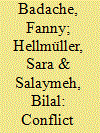

|
|
|
|
|
| Summary/Abstract |
This article examines how major powers conceive the role of the United Nations (UN) in peacebuilding. We conceptualize the UN’s role along the distinction between conflict management and conflict resolution and distinguish between the types of tasks and the approach the UN can adopt. We map states’ conceptions of the UN’s role in peacebuilding by coding peace-related speeches at the UN Security Council (1991–2020) delivered by China, France, Russia, the United Kingdom, the United States as well as Brazil, South Africa, and Turkey as rising regional powers. Our findings show that states’ conceptions differ regarding the type of tasks the UN should do. However, the main fault line between the countries lie in the approach the UN should adopt to conduct peacebuilding tasks. We conclude that major powers see a role for the UN beyond mere conflict management as long as it is done with respect for national sovereignty.
|
|
|
|
|
|
|
|
|
|
|
|
|
|
|
|
| 2 |
ID:
188614
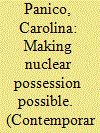

|
|
|
|
|
| Summary/Abstract |
This article interrogates the disarmament principle under Article VI of the NPT, drawing attention to how the disarmament discourse shapes and reproduces the nuclear status quo. Building on the work of Kimberly Hutchings and Maja Zehfuss, I argue that the disarmament discourse renders nuclear possession more acceptable. It enables nuclear states to present themselves as less violent and more responsible actors glossing over the nature of possessing nuclear weapons. Using a feminist poststructuralist lens and examining empirical illustrations, the article explains how declarations of strict observance of the disarmament principle reaffirm traits and values that underpin social expectations of what is considered ethical and appropriate in nuclear politics. Moreover, it shows how the rhetorical commitment to a world free of nuclear weapons reinstitutes and preserves existing understandings around nuclear responsibility that define the bounds of acceptable nuclear possession, perpetuating the dominant status quo.
|
|
|
|
|
|
|
|
|
|
|
|
|
|
|
|
| 3 |
ID:
188611
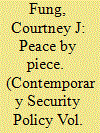

|
|
|
|
|
| Summary/Abstract |
How do states respond to peacekeeper fatalities? Peacekeeper fatalities incur costs for contributing states, leading to recalculations of whether voluntary troop deployments generate benefits. Yet it remains unclear how states with non-democratic regime types respond to peacekeeping troop fatalities, whether the ensuing foreign policy decision rests on tactical decisions to continue troop contributions to the mission, and if states affix the same costs to every peacekeeper fatality regardless of how the fatality occurs. This article builds upon existing studies with a detailed case study of China, a non-Western, non-liberal UN troop contributor. China only recently experienced peacekeeper fatalities by malicious acts, which prompted China to become an emerging policy leader regarding peacekeeper safety and security. China’s policy response highlights discomfort about accepting higher levels of danger as a given for UN peacekeeping, with implications for the debate on the robust use of force and China’s approach to international institutions.
|
|
|
|
|
|
|
|
|
|
|
|
|
|
|
|
| 4 |
ID:
188613
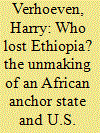

|
|
|
|
|
| Summary/Abstract |
In November 2020, Ethiopia descended into full-scale civil war which, owing to mass atrocities and regional intervention, metastasized into among the most acute humanitarian emergencies in the world. The violent fragmentation of state authority tarnished Ethiopia’s internationally sanctioned role as regional peacekeeper and developmental leader—an “anchor state” of the Pax Americana in the Horn of Africa. While acknowledging the complex, multi-dimensional origins of the conflict, this article examines how efforts by the U.S. government to reinvent the strategic relationship during the 2018–2020 political transition in Addis Ababa helped pave the road to war. We argue that U.S. policymakers provided largely unconditional support to Ethiopia’s new Prime Minister Abiy Ahmed, creating problems of moral hazard that encouraged confrontation between rival political forces. The story of U.S. engagement in Ethiopia in this period illustrates the perils of Washington’s efforts to rebalance fraught relations with its most important regional anchors.
|
|
|
|
|
|
|
|
|
|
|
|
|
|
|
|
| 5 |
ID:
188612
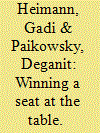

|
|
|
|
|
| Summary/Abstract |
Established powers enjoy privileges in world politics coveted by emerging powers. These privileges vary in their level of institutionalization: full formal privileges, partial formal privileges, and informal privileges. We identify two alternative strategic routes through which emerging powers target these three types of privileges: a top-down and a bottom-up route. We analyze two factors that impact the choice between these two routes: restrictiveness of eligibility criteria for winning privileges, and the expected levels of opposition by both established powers and outsiders. We examine the impact of these factors on two cases in which India negotiated privileges: India’s top-down campaign to win a permanent seat on the UN Security Council; and India’s bottom-up campaign to enter the nuclear club as a de facto nuclear weapon state. Highly restrictive eligibility criteria along with high levels of opposition drove India to gradually seek nuclear privileges through a bottom-up route.
|
|
|
|
|
|
|
|
|
|
|
|
|
|
|
|